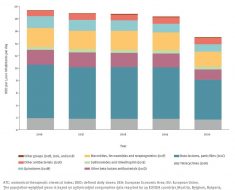
Researchers in China have discovered that inhibiting a protein called the GABAA receptor can protect intestinal stem cells from the toxic effects of chemotherapy and radiotherapy.
The study, published in the Journal of Experimental Medicine (JEM), suggests that the FDA-approved anti-sedative flumazenil, which targets GABAA receptors, could alleviate some of the common gastrointestinal side effects, such as diarrhea and vomiting, induced by many cancer treatments.
Because they have to continually proliferate and replace the cells lining the wall of the gut, intestinal stem cells are highly sensitive to chemotherapy and radiotherapy. These treatments damage the DNA of intestinal stem cells and cause them to die, leading to intestinal injury and a variety of painful gastrointestinal symptoms. These toxic side effects, which can persist long after treatment is finished, limit the drug or radiation dose that can be given to cancer patients and worsen their quality of life.
A research team led by Dawei Chen and Jingxin Li at Cheeloo College of Medicine, Shandong University, discovered that the levels of a protein called GABRA1 increase in the intestinal stem cells of mice treated with either radiation or a chemotherapy drug. GABRA1 is a component of the GABAA receptor, which is best known for its role in the nervous system, where it binds to the neurotransmitter g-aminobutyric acid (GABA). But GABA and the GABAA receptor are also present in other tissues throughout the body.
The researchers found that inhibiting the GABAA receptor protected mice from the toxic side effects of chemo- or radiotherapy, reducing the amount of DNA damage and increasing the survival of intestinal stem cells. This enabled the mice to maintain a normal gut lining and survive lethal doses of irradiation or chemotherapy drugs.
Chen and colleagues found that inhibiting the GABAA receptor protects intestinal stem cells from DNA damage by limiting the formation of free radicals in response to chemoradiotherapy. Crucially, however, the researchers determined that inhibiting the GABAA receptor does not prevent radiation or chemotherapy drugs from killing cancer cells.
Flumazenil is a cheap, GABAA receptor inhibitor approved by the U.S. Food and Drug Administration to treat benzodiazepine overdoses and reverse anesthesia. Chen and colleagues found that flumazenil was also able to protect the intestines of mice from the toxic effects of chemoradiotherapy. Moreover, flumazenil also protected human colonic organoids—miniature organs grown in the lab from human colonic stem cells—from chemotherapy drugs and irradiation.
Source: Read Full Article





